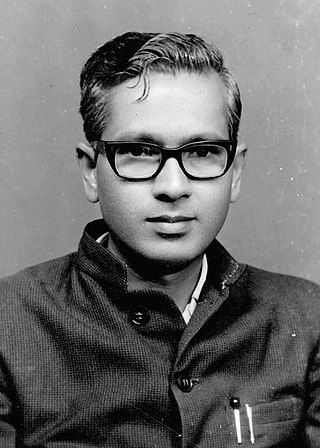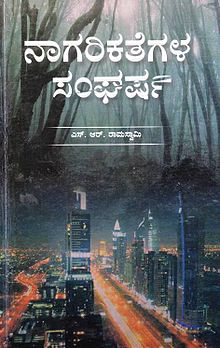
Kannada literature is the corpus of written forms of the Kannada language, a member of the Dravidian family spoken mainly in the Indian state of Karnataka and written in the Kannada script.

Talukina Ramaswamayya Subba Rao (1920–1984), popularly known as TaRaSu, was an Indian novelist and a scholar in the Kannada-language. He is considered as a harbinger of the Navya movement of Kannada literature. He is well known for his novels like Durgashtamana, which won him the Sahitya Akademi award posthumously in 1985.

Devanahalli Venkataramanaiah Gundappa, popularly known as DVG, was an Indian writer, poet and philosopher in Kannada-language. He is one of the stalwarts of modern Kannada literature. His most notable work is the Mankuthimmana Kagga, which is similar to the wisdom poems of the late medieval poet Sarvajna.

Ambale Ramakrishna Krishnashastry (1890–1968) was an Indian writer, researcher and translator in the Kannada language. Krishnashastry has remained popular four decades after his death through his work Vachana Bharata, and his narration of the Hindu epic Mahabharata in the Kannada.

Theerthapura Nanjundaiah Srikantaiah commonly known as 'Thee. Nam. Shree., was a Kannada poet, essayist, editor, translator, linguist and teacher. He was awarded the Pampa Prashasthi for his work on the history and tradition of Indian poetics spanning two millennia titled Bharathiya Kavyamimamse. T. N. Srikantaiah was instrumental in preparing and publishing the Kannada version of Constitution of India in 1952. He is credited with the use of the vernacular equivalent of Rashtrapathi for the English 'President', a usage which is still in vogue. Srikantaiah was responsible for guiding the doctoral theses of Kannada litterateurs like S. Anantanarayan and M. Chidananda Murthy. An active participant in the Kannada Dictionary Project, Srikantaiah later laid the foundations for the Post Graduate Department at Manasa Gangotri campus at University of Mysore.
Nittoor Srinivasa Rao or Nittur Srinivasa Rao was a Gandhian who participated in the Indian independence movement. He was the Chief Justice of the High Court of Mysore State and also the first chief of the Central Vigilance Commission of India. He was also chosen as the acting Governor of the Mysore state and was the first person to translate Mahatma Gandhi's autobiography to the Kannada language.

Ganjam Venkatasubbiah, also known as G. V., was a Kannada writer, grammarian, editor, lexicographer, and critic who compiled over eight dictionaries, authored four seminal works on dictionary science in Kannada, edited over sixty books, and published several papers. Recipient of the Kannada Sahitya Akademi Award and the Pampa Award, Venkatasubbiah's contribution to the world of Kannada Lexicography is vast. His work Igo Kannada is a socio-linguistic dictionary which encompasses an eclectic mix of Kannada phrases, usages, idioms, and serves as a reference for linguists and sociologists alike.

Mysore Venkatadasappa Seetharamiah or M. V. See was an Indian Kannada language author, editor and translator. Through a career spanning over sixty years, he published over 100 works spanning short stories, poetry, novels, and dramas. Some of his notable works included Sri Vijaya kruta Kavirajamarga, a retelling of the classical Kavirajamarga, Udayadityalankara, a work on Kannada poetics, and also other works on ancient Kannada language grammar.

Rallapalli Ananta Krishna Sharma was a noted composer of Carnatic music, singer, Telugu litterateur, teacher and Sanskrit scholar. He was responsible for discovering, cataloguing and putting to music many forgotten compositions of Annamacharya. These compositions composed hundreds of years ago came back to life thanks to Sharma's efforts and successive singers like S. P. Balasubramanyam and M. S. Subbalakshmi would sing many of them, hence popularising them. Sharma authored prose works like Vemana, Natakopanyasamulu,Ganakale,Sahitya Mattu Jeevana Kale and Saraswatalokamu. Rallapalli Ananta Krishna Sharma translated 395 Gathas from original Prakrit into Telugu language titled Shalivahana Gatha Sapta Saramu in 1931. Sharma is the recipient of Central Sangeet & Natak Academy Fellowship (1973), Gana Kala Sindhu (1961), Gana Kala Prapoorna (1969), Sangeeta Kala Ratna (1974) and Sangeeta Sahitya Asthan Vidwan honours with an Honorary Doctorate from TTD University, Andhra Pradesh.

Togere Venkatasubbasastry Venkatachala Sastry, commonly known as T. V. Venkatachala Shastry, is a Kannada-language writer, grammarian, critic, editor and lexicographer. He has authored in excess of 100 books, translations and has edited collections of essays, biographical sketches and felicitation volumes. Recipient of the Kannada Sahitya Akademi Award (honorary), Sastry is an authority on Kannada language grammar and its various facets ranging from the metre scale on which he has written extensively to the history of Kannada literature spanning two millennia.

Sondekoppa Srikanta Sastri was an Indian historian, Indologist, and polyglot. He authored around 12 books, over two hundred articles, several monographs and book reviews over four decades in English, Kannada, Telugu and Sanskrit. These include "Sources of Karnataka History", "Geopolitics of India & Greater India", "Bharatiya Samskruthi" and "Hoysala Vastushilpa". S. Srikanta Sastri was a polyglot well versed in fourteen languages spanning Greek, Latin, Pali, Prakrit, Sanskrit and German among others. He was Head of the Department of History & Indology at Maharaja College, University of Mysore between 1940 and 1960. He was conferred the Kannada Literary Academy award in 1970 and was subsequently honoured by Governor of Karnataka Mohanlal Sukhadia in 1973 during mythic society diamond jubilee function. A Festschrift was brought forth and presented to him during his felicitation function in 1973 titled "Srikanthika" with articles on History and Indology by distinguished scholars. His work on Indus Valley civilization and town planning at Harappa and Mohenjodaro were published in successive articles and drew considerable attention. His articles on The Aryan Invasion theory, the date of Adi Sankaracharya, Oswald Spengler's view on Indian culture, Jaina epistemology, Proto-Vedic religion of Indus Valley Civilization and evolution of the Gandabherunda insignia remain relevant today.

Mysore Hatti Krishna Iyengar was an Indian historian, archaeologist, epigraphist and authority in Indian numismatics. He pioneered the new field of Indology involving the study of Indian culture, history, music and traditions from a historical perspective. He is credited with the discovery of one of the oldest Kannada inscriptions, the Halmidi inscription, dating back to 350 A. D. He also discovered the remains of the city of Isila near Brahmagiri during his excavations at Chandravalli, Chitradurga. The forgotten tomb of Shahaji was traced by M. H. Krishna during his years at the Mysore Archaeological Department. His years at the Archaeology Department saw him churn out many of excavation reports and these were later published in successive volumes of Epigraphia Carnatica. During Krishna's tenure at Bangalore, he was instrumental in cataloguing close to 6000 coins in the archives of the archaeology department there. He was trained at the University College, London under Ernest Arthur Gardner. and would later accompany Sir Flinders Petrie in his excavations in Egypt.

Doddabele Lakshmi Narasimhachar was a Kannada linguist, grammarian, lexicographer, writer, literary critic and editor who taught at the Department of Kannada Language Studies, University of Mysore between 1932 - 1962. His knowledge of Halegannada helped him in reading ancient epigraphic records. He authored four books in Kannada, edited about nine volumes, penned eleven prefaces, wrote nearly hundred articles across three decades, seven monographs in English and outlined introductions to four Kannada works. He presided over the forty first Kannada Sahitya Sammelan held at Bidar in 1960. He was the recipient of the Kannada Rajyotsava Award from the Mysore State. In 1969, his alma mater - University of Mysore bestowed on him an Honorary Doctorate in recognition of a lifetime contribution to the world of Kannada studies.

Haleyuru Srinivasa Krishnaswamy Iyengar was a Kannada columnist, essayist, novelist, critic and teacher of Economics and Commerce studies in Mysore. He is remembered for his character sketches and short essays on personalities and issues of national & international import, in his weekly column "Varada Vyakthi". These appeared in the Kannada magazine "Sudha" continuously for nearly two decades. His literary critique "Kannadadalli Vidambana Sahitya" won him the Kannada Sahitya Akademi Award in 1981. His perspective on elements of Vishistadvaita in the works of Kuvempu were brought forth in his book "Kuvempu Sahityadalli Vishistadvaita – Darshana". H. S. K. penned close to thousand character sketches over two decades. These were later published in four collected volumes. He received the "Rajyotsava Award" from Government of Karnataka in 1997. For his lifetime contribution to Journalism and Kannada literature, the University of Mysore conferred a doctorate degree on him in 2004.

Venkataramaiah Seetharamaiah commonly known as Vee See, was a Kannada poet, writer, essayist, critic, editor and teacher who taught Kannada literature at University of Mysore between 1928 and 1955. He is a recipient of the Karnataka Sahitya Akademi Award (1973), Kendra Sahitya Akademi Award and an Honorary Doctorate from University of Mysore in 1976. He presided over the 36th Kannada Sahitya Sammelana at Kumta in 1954.

Taľaku Subbanna Venkannayya was University of Mysore's first Kannada Professor. He was also a popular Kannada writer, translator, editor and teacher who nurtured many later Kannada littérateurs like Kuvempu, D. L. Narasimhachar, T. N. Srikantaiah, K. S. Narasimhaswamy, M. V. Seetharamaiah, C. K. Venkataramaiah, K. Venkataramappa, G. Venkatasubbiah and S. V. Parameshwara Bhatta. In fact, Kuvempu begins his book Sri Ramayana Darshanam with a two-page dedication to his teacher T. S. Venkannayya. T. S. Venkannayya translated the biography of Ramakrishna Paramahamsa from Bengali into Kannada for the first time in 1919. T. S. Venkannayya along with D. V. Gundappa, V. Seetharamaiah, B. M. Srikantaiah and T. N. Srikantaiah were at the forefront of the Kannada Movement from 1920s onwards and were instrumental in the founding of Kannada Sahitya Parishat (Bangalore) and Kannada Sangha at Central College, Bangalore and Maharaja College, Mysore. T. S. Venkannayya was responsible for the organising of the 1931 Kannada Sahitya Sammelan at Mysore.





















